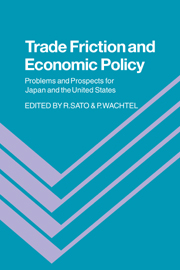Book contents
- Frontmatter
- Contents
- Foreword by Richard R. West
- Preface
- List of contributors
- 1 Introduction
- Part I Sources of trade friction
- Part II Macroeconomic policy
- Part III Trade policy
- 10 Costs and benefits to the United States of the 1985 steel import quota program
- 11 Limits of trade policy toward high technology industries: the case of semiconductors
- Index
11 - Limits of trade policy toward high technology industries: the case of semiconductors
Published online by Cambridge University Press: 05 February 2012
- Frontmatter
- Contents
- Foreword by Richard R. West
- Preface
- List of contributors
- 1 Introduction
- Part I Sources of trade friction
- Part II Macroeconomic policy
- Part III Trade policy
- 10 Costs and benefits to the United States of the 1985 steel import quota program
- 11 Limits of trade policy toward high technology industries: the case of semiconductors
- Index
Summary
The semiconductor industry is among the fastest growing and most technologically dynamic of all manufacturing industries. Semiconductors are increasingly pervasive in their product applications. They are creating new levels of performance in consumer, industrial, and military products; thus, they appear to be the basis for a new “industrial revolution.”
Since the industry's beginning, U.S. firms have been dominant in terms of sales and technological innovation, but the competitiveness of Japanese firms has been rising. For a number of years U.S. firms have complained about the unfair competitive practices of Japanese firms and the unfair policies of the Japanese government. In 1985 these complaints became formal trade actions–three dumping suits and a petition charging unfair trade practices. In addition, U.S. firms continue to accuse Japanese firms of illegally copying U.S. technology – two new major infringement suits were filed in 1985 and early 1986.
This chapter describes and analyzes U.S.–Japanese semiconductor trade frictions and these formal actions against Japanese firms and the Japanese government. It focuses on an examination of the U.S. national economic interest in semiconductors, which may be different from the interests of the firms in the U.S. semiconductor industry. It discusses the implications of this analysis for U.S. government policy toward the industry. The analysis includes an examination of the applicability of the new theory of strategic trade policy to the industry, as well as a discussion of more traditional considerations in the formulation of government policy.
Information
- Type
- Chapter
- Information
- Trade Friction and Economic PolicyProblems and Prospects for Japan and the United States, pp. 184 - 237Publisher: Cambridge University PressPrint publication year: 1987
Accessibility standard: Unknown
Why this information is here
This section outlines the accessibility features of this content - including support for screen readers, full keyboard navigation and high-contrast display options. This may not be relevant for you.Accessibility Information
- 1
- Cited by
